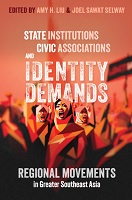State Institutions, Civic Associations, and Identity Demands
External Review of Whole Manuscript
Regional Movements in Greater Southeast Asia
Contributor(s)
Liu, Amy H. (editor)
Selway, Joel Sawat (editor)
Language
EnglishAbstract
While the media tends to pay the most attention to violent secessionist movements or peaceful independence movements, it is just as important to understand why there are regions where political movements for autonomy fail to develop. In neglecting regions without political movements or full-blown independence demands, theories may be partial at best and incorrect at worst.
State Institutions, Civic Associations, and Identity Demands examines over a dozen regions, comparing and contrasting successful cases to abandoned, unsuccessful, or dormant cases. The cases range from successful secession (East Timor, Singapore) and ongoing secessionist movements (Southern Philippines), to internally divided regional movements (Kachin State), low-level regionalist stirrings (Lanna, Taiwan), and local but not regional mobilization of identity (Bali, Minahasan), all the way to failed movements (Bataks, South Maluku) and regions that remain politically inert (East and North Malaysia, Northeast Thailand). While each chapter is written by a country expert, the contributions rely on a range of methods, from comparative historical analysis, to ethnography, field interviews, and data from public opinion surveys. Together, they contribute important new knowledge on little-known cases that nevertheless illuminate the history of regions and ethnic groups in Southeast Asia. Although focused on Southeast Asia, the book identifies the factors that can explain why movements emerge and successfully develop and concludes with a chapter by Henry Hale that illustrates how this can be applied globally.
Keywords
Southeast Asia, Regional Identity, Political Movements, Identity Salience, Secessionism, Regionalism, Ethno-nationalism, Regional Parties, Ethnic Violence, Ethnic Conflict, Ethnicity, Nationalism, Religion, Ethnic Minorities, Regional Movements, Civic Associations, Civil Society, State Institutions, State Strength, Statebuilding, Education, Religious Networks, Cultural Preservation, Myanmar, Thailand, Philippines, Indonesia, Malaysia, East Timor, Singapore, Taiwan, Kachin, Lanna, Isan Issan, Isaan, Northern Thailand, Northeastern Thailand, Moros, Southern Philippines, Mindanao, East Malaysia, Peninsular Malaysia, Sabah, Sarawak, Batak, Bali, South Maluku, Minahasan, North SumatraDOI
10.3998/mpub.12333333ISBN
9780472076079, 9780472056071, 9780472903412Publisher
University of Michigan PressPublisher website
https://www.press.umich.edu/Publication date and place
2024Series
Emerging Democracies,Classification
Politics and government
Comparative politics
Political structures: democracy


 Download
Download